The best mesh Wi-Fi systems in 2024: our favorite systems for home and business use
We pull together the best mesh Wi-Fi system for your home in one place
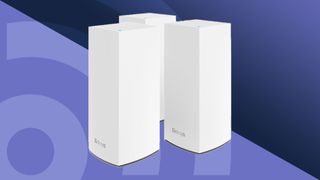
If you're experiencing Wi-Fi dead zones in your home, investing in one of the best mesh Wi-Fi systems can dramatically improve your network coverage and ensure reliable connectivity in every room. These systems consist of a main router and satellite nodes that work together to create a seamless network, eliminating weak signals and buffering issues.
One standout option is the Google Nest Wi-Fi system, known for its excellent performance, user-friendly setup, and the added bonus of a built-in smart speaker. It's a versatile choice that not only enhances your internet experience but also integrates with your smart home devices.
For those mindful of budget, the TP-Link Deco M5 offers impressive value, delivering strong coverage for everyday browsing and streaming without breaking the bank.
If your goal is simply to extend the reach of your existing router, a Wi-Fi extender might suffice. However, for comprehensive and consistent coverage, a mesh Wi-Fi system is highly recommended. Our extensive testing of the best mesh Wi-Fi systems, including Wi-Fi 6 and secure routers, can guide you in selecting the perfect fit for your home.
The best mesh Wi-Fi systems on Black Friday
Black Friday deals are the perfect way to buy one of the best mesh Wi-Fi systems due to the significant discounts and deals available during this major shopping event.
Mesh Wi-Fi systems are excellent for eliminating dead zones and providing reliable, high-speed internet coverage throughout your entire home. However, these advanced systems can be quite expensive, especially models that offer the latest features and technologies.
During Black Friday, retailers compete by offering substantial price reductions on electronics, including mesh Wi-Fi systems. This means you can acquire a high-quality system at a fraction of the regular price. Whether you're looking for a system that supports the newest Wi-Fi standards or one that integrates seamlessly with your smart home devices, Black Friday deals make it more affordable.
The quick list
The best mesh Wi-Fi systems are increasing in popularity, and there more options than ever. Since we regularly testing and reviewing Wi-Fi routers, we gathered all the best ones we've found, putting a list for every need and budget. Before hitting buy, make sure to tap "Read more below" to find out more about the option you're considering.

Best mesh Wi-Fi overall
Boasting great performance and coverage, the Google Nest Wifi Pro still remains the top contender as the best mesh Wi-Fi for most people.
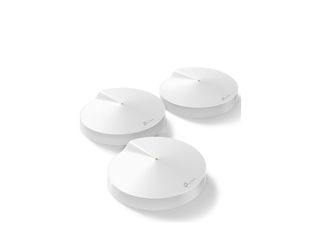
Best budget mesh Wi-Fi
It may not be as fast as the more-expensive offerings, but this cheap option is easy to setup, has good coverage, and offers great value for money.
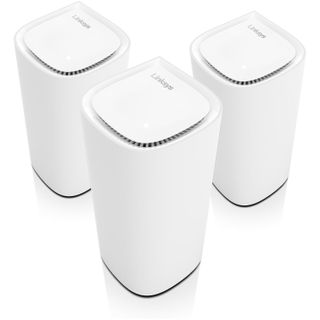
Best mesh Wi-Fi system with 6E
The Linksys Velop Pro 6E is a fantastic choice if you value performance and reliability above fancy feature sets.
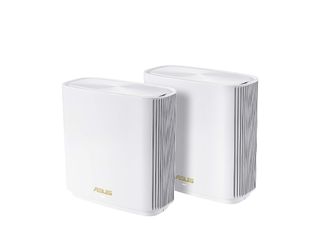
Best gaming mesh Wi-Fi system
A versatile mesh system, this delivers top-of-the-range performance for streaming video and gaming with advanced security features.
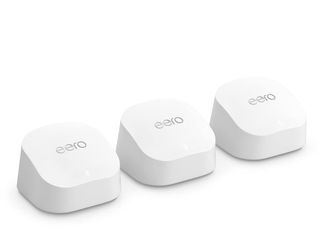
Best mesh Wi-Fi for homes
Though a bit more stripped down in terms of features, this mesh router competitively priced and provides a fast, reliable service for larger homes.
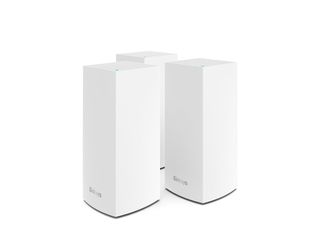
Best value mesh Wi-Fi
Another competitively-priced option, this mesh system offers impressive Wi-Fi 6 performance, an incredibly easy setup, and a great design.
Load the next four products...
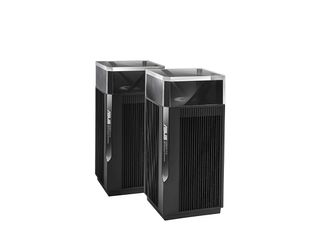
Best 6E for large spaces
If you need a top-of-the-line Wi-Fi 6E performance, this mesh system is designed for large office buildings and businesses with demanding needs.
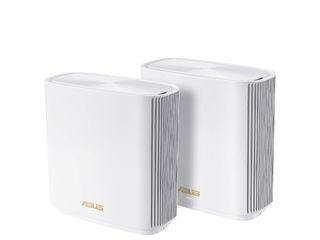
Best value for large homes
If money is no object, large households will appreciate the impressive range, performance and parental controls this Wi-Fi 6 system delivers.
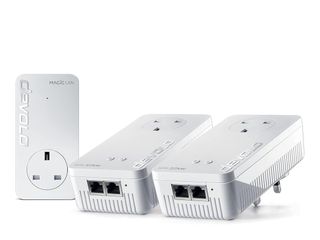
Best Powerline mesh Wi-Fi
Best for spaces with thick walls, this Powerline mesh system can reach every room in your home or office by utilizing a wired network connection.

Best mesh system for Wi-Fi 7
Looking for the fastest Wi-Fi speeds available? Then you're after Wi-Fi 7, and the Netgear Orbi 770 supplies it at a competitive price point.
The best mesh Wi-Fi systems 2024
Why you can trust TechRadar
The best mesh Wi-Fi system overall

1. Google Nest Wifi Pro
Specifications
Reasons to buy
Reasons to avoid
Google Nest Wifi Pro is the most recent iteration of the company’s popular mesh Wi-Fi system, replacing the Nest Wifi. So, what does the ‘Pro’ take on Google’s formula do differently? Well, the most obvious upgrade is support for Wi-Fi 6 and Wi-Fi 6E has been brought in, beefing up performance (compared to Wi-Fi 5 with the previous Nest Wifi).
On top of that, the Nest Wifi Pro boasts tri-band Wi-Fi as an upgrade over dual-band, offering not just 2.4GHz and 5GHz, but also a 6GHz band, delivering better coverage as well as faster speeds.
Other than a slightly tweaked design – these remain smart-looking devices that’ll fit unobtrusively into your home – the mesh router units are much the same otherwise, except that they’re now standalone devices. This means each unit is identical and has a pair of Ethernet ports – whereas previously, the satellites didn’t. However, on the other hand, something has been dropped – namely the integrated smart speaker functionality that the Nest Wifi had onboard.
Mind you, not everyone will miss that feature, and the better news is that smart home fiends are well-catered for here given the support for Matter which Google has introduced with the Pro version.
Okay, so the Nest Wifi Pro has notched up the pricing somewhat on the Nest Wifi, but overall it does a sterling job of giving you a better level of mesh Wi-Fi coverage, and more grunt on the performance front too, which is always welcome. And, if you’re tired of the color white, this also comes in Linen, Fog and Lemongrass colors. As far as the best mesh Wi-Fi routers go, this Google system is still the one to beat.
The best budget mesh Wi-Fi system
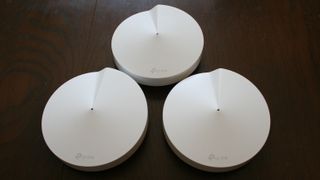
Specifications
Reasons to buy
Reasons to avoid
If you’re looking for a way to spread Wi-Fi throughout your home without having to spend a lot of dough, then look into the TP-Link Deco M5. It’s not as speedy as some of the other best mesh Wi-Fi system on this list. This system is focused more on coverage than high-throughput. However, it did improve our throughput significantly during testing.
Plus, if you’re not too concerned about getting the maximum theoretical throughput, which you probably won’t be able to take full advantage of anyway, this shouldn’t be too much of an issue. Setup, similar to the other devices here, is a breeze, even if you’re not tech-savvy. The TP-Link Deco M5 is among the best wireless mesh routers for those who don’t want to get too technical. And, as it is much cheaper than the rest of the options here, it's also the best mesh Wi-Fi system for budget-minded households.
Read our full TP-Link Deco M5 review
The best mesh Wi-Fi system with 6E
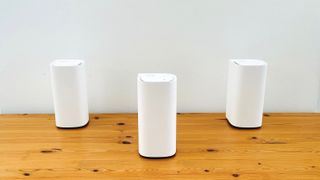
Specifications
Reasons to buy
Reasons to avoid
If you’re looking to upgrade your mesh router, chances are you care about one thing above all others: performance. Here, the Linksys Velop Pro 6E is an excellent option. In our testing, it provided consistent 150Mbps download speeds, even when we placed it 30 feet away and behind three partition walls. In fact, it’s capable of hitting speeds of up to 5.4Gbps, making it a seriously speedy router for your home setup. It can easily cover your entire house or office if required, making it ideal for when you really need that stable connection.
It's something of a “no frills” mesh system, and it lacks some of the high-end features provided by some of its rivals. Yet it’s not totally devoid of additional utility. Each Velop router can handle up to 200 connected devices, for example, making it perfect for homes with hordes of internet-enabled devices. It’s also competitively priced among other mesh routers, so if all you need is rock-solid performance, it’s an attractive option.
Read our full Linksys Velop Pro 6E review
The best mesh Wi-Fi system for gaming
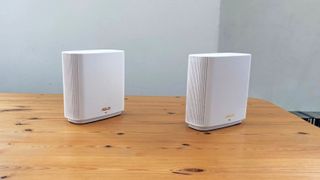
Specifications
Reasons to buy
Reasons to avoid
The Asus ZenWiFi AX (XT8) is a Wi-Fi 6 mesh router, and while it's among the more expensive options out there, and limits you to two router units, this Asus system offers blazing fast speeds as well as plenty of flexibility in its setup – such as the option to set up one or two networks using the 2.4 and 5GHz bands.
During our tests, it manage to push our 50Mbps internet connection all the way, even squeezing it up to 60Mbps at one point. It also held download speeds steady at 7.3MB/s even on the slower 2.4GHz band in an area in our space with previously low connectivity issues.
Setup isn't quite as straightforward. However, with excellent security features to boot, this is a fantastic choice if you’re looking at the best mesh Wi-Fi systems.
Read our full Asus ZenWiFi AX (XT8) review
The best mesh Wi-Fi system for homes
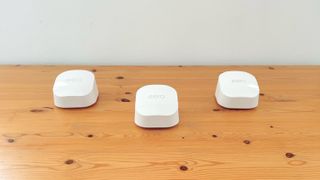
Specifications
Reasons to buy
Reasons to avoid
Eero has always been excellent at releasing affordable, reliable routers, and the latest addition to its line, the Eero 6+ doesn’t fall far from the best value tree. It’s competitively-priced and an improvement over its predecessor with its fast and reliable coverage that’s good enough for larger homes.
Despite sticking with dual-band Wi-Fi 6, it’s almost twice as fast as its predecessor with its 3.0Gbps top speed. It, of course, performs beautifully in practice, reaching the maximum speed supported by our office broadband connection on Ookla and Steam during testing. Included in the price are new features, such as some additional Ethernet ports, support for the latest smart-home technologies, and support for Bluetooth Low Energy 5.0 and the new low-power wireless technology called Thread.
Sadly, parental controls require a paid subscription and the Eero app feels a little limited in functionality. But, you’re getting a lot of value for your money here.
Read our full Eero 6+ review
The best value mesh Wi-Fi with easy setup
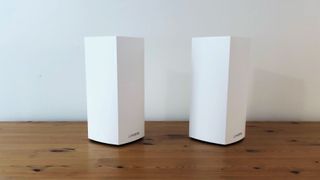
Specifications
Reasons to buy
Reasons to avoid
The Linksys Velop WiFi 6 AX4200 is proof that Wi-Fi 6 mesh systems can be affordable and accessible. It gives big households on a budget an excellent option that still delivers admirable performance and ease of use.
If you want to improve your home network’s speed and connectivity, this state of the art mesh system is an ideal solution. During our tests, it smoothly handed the Wi-Fi signal over to the second node that we placed closer to a harder-to-reach area in our space while maintaining the same speeds seamlessly.
Those who aren’t as computer savvy will also appreciate that easy-to-use Linksys app. It explains everything from connecting to your existing broadband router in order to use its Internet connection to where to place any additional nodes in order to get the best Wi-Fi reception.
Read our full Linksys Velop WiFi 6 AX4200 review
The best 6E mesh Wi-Fi for large spaces
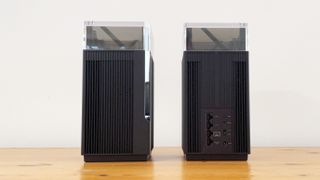
Specifications
Reasons to buy
Reasons to avoid
Larger homes and offices need a much more robust mesh system like the Asus ZenWiFi Pro ET12. This Wi-Fi 6E mesh system might be a bit of an overkill for most users, but there are still many that will benefit from the level of performance and range it brings – particularly those that have massive spaces and high network demands to cover.
With it, you're getting a top speed of 11Gbps as well as a 6,000-square-foot range (if you get the router and a node set). It delivers in practice as well. During our testing of the two-pack set, the first ET12 gave us the maximum speeds provided by our office broadband service and the second unit allowed us to maintain those speeds, even in the hard-to-reach areas.
Read our full Asus ZenWiFi Pro ET12 review
The best value mesh Wi-Fi for large homes
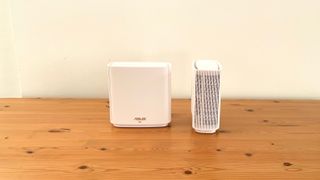
Specifications
Reasons to buy
Reasons to avoid
The Asus ZenWifi XT9 may be an expensive proposition for smaller homes and budget users, but those who have larger areas to cover and a much busier network, this tri-band Wi-Fi 6 router is a wise investment. Its impressive range and strong performance should see larger homes through their bigger demands.
The 7.8Gbps speed will meet the demands of most of the bigger households, and its 2.5Gbps Ethernet is just as future-proof. We were able to get smooth, steady speeds of 150Mbps and 19Mb/s for Ookla and Steam, even on the slower 2.4GHz band, during testing. And, that's in an area where our regular router typically struggles to deliver.
As a bonus, it comes with free parental controls - something many of its rivals actually charge a monthly subscription for. That makes it an even great value for families with kids.
To save money on Asus products, check out our Asus promo codes.
Read our full Asus ZenWifi XT9 review
The best Powerline mesh Wi-Fi system
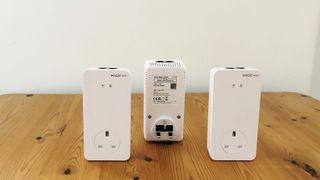
Specifications
Reasons to buy
Reasons to avoid
The Magic 2 WiFi 6 Mesh absolutely smashes through thick walls and massive obstructions by using Powerline technology to break through those obstacles. This mesh Powerline system allows you to enjoy robust and uninterrupted connectivity throughout your space even when you're dealing with an older space that regular mesh Wi-Fi routers cannot handle.
Of course, if you’ve got a large house or building with a number of rooms to cover, that mesh technology via plug-in adapters also ensures that there aren’t any dead zones or weak areas.
Performance-wise, it slays as well. It had no trouble cruising along at 110Mbps and delivering a rock-steady 12.5MB/s for Steam downloads. Its Wi-Fi speeds are relatively modest, but it’s more than enough for what most general users and households need. And, if you require an even more solid and faster connection, two Ethernet ports per device are on hand.
Read our full Devolo Magic 2 Wi-Fi 6 Mesh review
The best mesh system for Wi-Fi 7
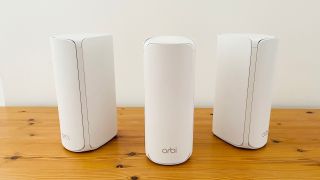
Specifications
Reasons to buy
Reasons to avoid
Wi-Fi 7 can provide a significant boost to your home Wi-Fi, but most routers offering this connectivity cost a pretty penny. While we wouldn’t call the Netgear Orbi 770 “cheap,” it’s still reasonably priced considering all of the fantastic features you get (especially compared to Netgear’s other very expensive routers).
It boasts performance that should eliminate Wi-Fi dead spots in all but the most expansive of homes. Our testing saw it eat up a pesky dead spot that has tripped up other routers in the past, blasting the full 150Mbps our broadband provided to all corners of the home. And with its ability to hit speeds of almost 11Gbps, it should be more than enough for any home user (and a fair few businesses, too).
The Netgear Orbi 770 supports some useful extras, too, including the ability to set up a dedicated internet of things (IoT) network for your smart home accessories, keeping your regular network free for everything else. And it features multi-link operation too, which lets it combine the 5.0GHz and 6.0GHz bands together in order to improve performance (provided your devices support Wi-Fi 7). That all makes it a premium mesh router system that should last for years to come.
Read our full Netgear Orbi 770 review
How to choose the best mesh Wi-Fi system for you
When choosing the best mesh Wi-Fi system for you, there are a few important considerations starting with the size of your coverage area and the speed you require depending on your daily average needs and the amount of devices that regularly use your network. Based on that, you need to take a look at the mesh Wi-Fi system's range and performance.
Also take a look at the design, setup process, and ease-of-use for when you need to adjust settings during use. Other features like security protocols and parental controls are important as well, and gaming-focused extra if there are gamers in the family.
Of course, the price is a major factor. Remember that many of the best mesh Wi-Fi routers tend to be expensive. However, you will find more affordable options if you know where to look.
Frequently asked questions
What does mesh Wi-Fi do?
In simple terms, a mesh setup combines a main Wi-Fi router with several additional satellites. These act as separate hubs that beam Wi-Fi signal around your home. This means that instead of relying on a single router that must reach every corner of your house, you have a team of routers, each responsible for a different area.
As you move around your home, your connected devices will automatically connect to whichever mesh satellite is providing the strongest signal. In many cases, these satellites all appear as a single network, making it simple to connect to the mesh system without having to manually select the strongest signal. It also means that you don’t have a host of devices clogging up a single router, and this can help to improve your connection strength and speed.
Generally speaking, mesh Wi-Fi systems are overkill for small homes and apartments, where a regular router should be enough to cover every corner. But if you have a large home or business – or frequently suffer from Wi-Fi dead spots that lack proper internet signal – one of the best mesh Wi-Fi systems can be an excellent solution.
What is the best mesh Wi-Fi brand?
The best mesh Wi-Fi systems include several different brands, each with its own particular strengths, and the best brand for you will depend on your specific needs. For instance, Google and Netgear provide rock-solid connectivity and are ideal for whole-home coverage or for small business use.
If gaming is your jam, brands such as Asus deliver the best mesh Wi-Fi systems, as they are specifically designed with online gaming in mind. For beefed-up security, brands like TP-Link, Netgear, and Asus all offer robust solutions to safeguard you and your data.
Is mesh Wi-Fi better than a traditional router?
The short answer is yes if you happen to live in a larger home, as a mesh Wi-Fi system is better at covering a large area than a traditional router.
If your home has large square footage or is built on several stories, a mesh system can help keep coverage constant and reliable across the whole space.
However, gaming-heavy households may prefer to install one of the best gaming routers instead, as these supply speeds that most mesh Wi-Fi systems aren’t capable of delivering. And if you're in a smaller apartment or office, then a regular router should be more than enough coverage, and a mesh Wi-Fi system will not give you much benefit, if any, for the extra expense.
How we test mesh Wi-Fi systems
We test every mesh Wi-Fi router that lands on our desk before we can recommend it to you. Much like with any peripheral or device we test, we check everything from its design and features to its performance.
We take a look at its design, of course, because if you’re going to have several routers spread around your space, they should blend in with your home or office aesthetics. We also check its ports and any extra features it might have – like the ability to create a guest network and set up family controls – as well as ease of initial setup and use.
Then we move on to its performance. We check its range and strength of coverage as well as perform the Ookla speed test and our file download test, jotting down any information we collect. Naturally, we also test it against our everyday network usage to give you a glimpse on its real-world performance.
We then take everything we’ve learned and measure all that against its price tag to see if it’s a great value to consumers.
Get the best Black Friday deals direct to your inbox, plus news, reviews, and more.
Sign up to be the first to know about unmissable Black Friday deals on top tech, plus get all your favorite TechRadar content.

Named by the CTA as a CES 2023 Media Trailblazer, Allisa is a Computing Staff Writer who covers breaking news and rumors in the computing industry, as well as reviews, hands-on previews, featured articles, and the latest deals and trends. In her spare time you can find her chatting it up on her two podcasts, Megaten Marathon and Combo Chain, as well as playing any JRPGs she can get her hands on.
- Rob WebbContributing Writer
- John LoefflerComponents Editor
- Alex BlakeFreelance Contributor